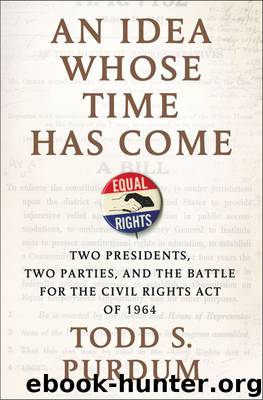An Idea Whose Time Has Come: Two Presidents, Two Parties, and the Battle for the Civil Rights Act of 1964 by Purdum Todd S

Author:Purdum, Todd S. [Purdum, Todd S.]
Language: eng
Format: epub
Publisher: Henry Holt and Co.
Published: 2014-04-01T00:00:00+00:00
PART THREE
THE SENATE
8
You Listen to Dirksen!
TUESDAY, FEBRUARY 18, 1964
AFTER LYNDON JOHNSON’S WEEKLY White House breakfast meeting with the Democratic congressional leadership, his old friend Hubert Humphrey, the voluble Senate majority whip, stayed behind for a private word. The day before, when H.R. 7152 arrived in the Senate, the majority leader, Mike Mansfield, had named Humphrey as the bill’s floor manager for the coming fight, and now Johnson, that past master of legislative tactics and peerless student of the Senate’s realities, had a few words of strategic advice.
In most ways, Humphrey was an ideal choice to shepherd the civil rights bill through the southern Democrats’ guaranteed filibuster. He was buoyant, resilient, relentless—respected by colleagues on both sides of the aisle and both sides of the civil rights question—and perhaps no issue had meant more to him throughout his political career. As the idealistic young mayor of Minneapolis and Democratic candidate for the Senate from Minnesota in 1948, he had electrified the Democratic National Convention in Philadelphia by proposing a bold civil rights plank from the convention floor, after the party’s platform committee had declined to adopt it.
“My friends, to those who say that we are rushing this issue of civil rights,” Humphrey told the astonished delegates, ad-libbing what would become the most famous passage in one of the twentieth century’s most celebrated political speeches, “I say to them we are 172 years late! To those who say that this civil-rights program is an infringement on states’ rights, I say this: The time has arrived in America for the Democratic Party to get out of the shadow of states’ rights and to walk forthrightly into the bright sunshine of human rights!”
With the help of key big city bosses eager to appeal to black voters, Humphrey’s motion carried the day, and he won his Senate race as well. When Humphrey arrived in Washington in January 1949, his brashness at first rubbed the Senate’s old bulls the wrong way; it was a fellow freshman, Lyndon Johnson, already a Capitol Hill veteran from his years in the House, who helped their colleagues understand that the big-hearted liberal from Minnesota was worthy of acceptance by the club. Now, fifteen years later, Humphrey was a loyal lieutenant by the new president’s side, and Johnson took the opportunity to point out what he saw as the Minnesotan’s greatest vulnerability.
“You bomb throwers make good speeches,” the president said. “You have big hearts, you believe in what you say you stand for, but you’re never on the job when you need to be there. You spread yourself too thin making speeches to the faithful.” By contrast, Johnson warned, Richard Russell knew all the rules of the Senate and how to use them, while the liberals and civil rights supports could never seem to get organized.
“He was relentless, goading me, challenging me, belittling liberals in general as inept in dealing with parliamentary situations,” recalled Humphrey, who understood that his handling of the bill would amount to one long audition for the vice presidential nomination on Johnson’s ticket that fall.
Download
This site does not store any files on its server. We only index and link to content provided by other sites. Please contact the content providers to delete copyright contents if any and email us, we'll remove relevant links or contents immediately.
| African-American Studies | Asian American Studies |
| Disabled | Ethnic Studies |
| Hispanic American Studies | LGBT |
| Minority Studies | Native American Studies |
Cecilia; Or, Memoirs of an Heiress — Volume 1 by Fanny Burney(32548)
Cecilia; Or, Memoirs of an Heiress — Volume 2 by Fanny Burney(31947)
Cecilia; Or, Memoirs of an Heiress — Volume 3 by Fanny Burney(31932)
The Great Music City by Andrea Baker(31917)
We're Going to Need More Wine by Gabrielle Union(19034)
All the Missing Girls by Megan Miranda(15959)
Pimp by Iceberg Slim(14488)
Bombshells: Glamour Girls of a Lifetime by Sullivan Steve(14058)
For the Love of Europe by Rick Steves(13915)
Talking to Strangers by Malcolm Gladwell(13350)
Norse Mythology by Gaiman Neil(13349)
Fifty Shades Freed by E L James(13233)
Mindhunter: Inside the FBI's Elite Serial Crime Unit by John E. Douglas & Mark Olshaker(9324)
Crazy Rich Asians by Kevin Kwan(9279)
The Lost Art of Listening by Michael P. Nichols(7494)
Enlightenment Now: The Case for Reason, Science, Humanism, and Progress by Steven Pinker(7306)
The Four Agreements by Don Miguel Ruiz(6745)
Bad Blood by John Carreyrou(6611)
Weapons of Math Destruction by Cathy O'Neil(6267)
